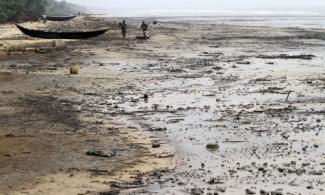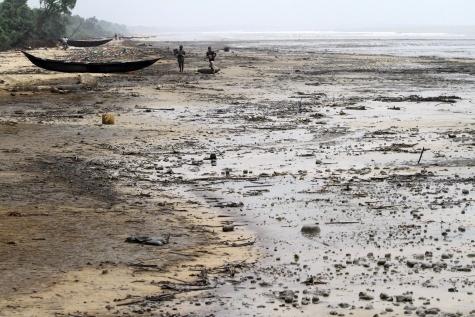
The claims by Ogale and Bille seek to confirm the findings of the Bodo judgment and, if successful, will mark a significant spread in Shell’s liability for their activities in the Niger Delta.
Every day is for the thief but one day is for the owner of the house and from all indications, the day to seek reprieve for communities battered by the irresponsible operations of foreign multinational oil companies in the Niger Delta seems to be gradually coming.

Those who know would attest to just how irresponsible Shell and some other foreign multinational oil companies have been in their operations in the region. And to say Shell and the rest of them have maintained an appalling record of obfuscation and misinformation with regard to their dealings in the Niger Delta is an understatement.
See now, if anybody had told Shell years ago that perceived inconsequential communities like Bodo, Ogale and Bille devastated by its irresponsible operational practices could drag the company to court not just in Nigeria but in the UK and get some reprieve, the Anglo-Dutch concern would have laughed it off as it believed it can do anything anyhow in this country and get away with it because it has the government and the Nigerian courts in its pockets.
But for the arrogance of impunity, Shell and other operators would have known that their failure to maintain and protect oil facilities would one day leave them liable to a raft of compensation claims from dozens of Niger Delta communities that are being devastated on daily basis by the IOCs operational irresponsibility.
Now, a London law firm, Leigh Day has filed two fresh Environmental lawsuits against Royal Dutch Shell on behalf of two Niger Delta communities devastated by oil pollution.
The key issue in the claim by Bille and Ogale communities in Rivers State is whether Shell can be liable for failing to protect their pipelines from damage caused by the company’s operations and/or third parties interference.
How do you explain that Ogale community in Rivers State has remained completely messed up by oil pollution from a Shell spill that occurred since 2009? For whatever reasons, Shell has bluntly refused to properly clean up and remediate the site, despite the fact that in its landmark 2011 report, the United Nations Environment Programme (UNEP) reported heavy pollution there – including groundwater contamination traversing several aquifer levels.
The case of Bille, another community in Rivers State is not different. Following the devastation caused by the spills emanating from an oil pipeline known as the Nembe Creek 30” Trunkline (NCTL) their livelihood has been totally destroyed.
The NCTL stretches for almost 100 kilometres and was built in 1981 and although money was recently spent to replace it, Shell failed to install leak detection systems to prevent and detect operational spills and/or protect against third party interference, known as bunkering, in breach of Nigerian legal standards.
Arrogantly as has always been the practice of the Anglo-Dutch company, Shell profusely refused to meet with leaders of the two communities despite repeated request by the peace-loving people of both areas to try agreeing a cleanup and compensation programme. Now the Communities are claiming for compensation and seeking to get Shell to clean up the damage caused by their oil.
As said by Amnesty International’s UK Economic Affairs Programme Director, Peter Frankental, “It’s disgraceful that Shell has to be dragged to the courts to address these issues. Surely time, money and the health, livelihoods and emotional anguish of the affected communities could have been spared had Shell simply accepted responsibility and cleaned up the oil spills quickly and thoroughly. It is hoped that the Bodo case and these new lawsuits by Ogale and Bille will spur Shell on to accept its responsibilities by cleaning up the oil spills and compensating those in the Niger Delta whose lives have been devastated by them.
It would be recalled that Shell has already paid out £55 million to the Bodo community in the Ogoni area of Rivers State after settling its claim out of court in January 2015. Court documents from that case show that Shell admitted that it had underestimated the volume of oil spills in the area. Shell had repeatedly asserted that the volume of oil spills was 4,000 barrels of oil affecting the Bodo community, while expert evidence put the volume of oil spilt in the region of 500,000 oil barrels. In the judgment handed down in the Bodo litigation, the court held that where it can be shown that Shell neglected to protect their pipelines properly, they could be liable for the damage arising from their neglect.
The claims by Ogale and Bille seek to confirm the findings of the Bodo judgment and if successful will mark a significant spread in Shell’s liability for their activities in the Niger Delta.
The Nigerian subsidiary of the Anglo-Dutch oil giant, Shell Petroleum Development Company of Nigeria (SPDC) has a plethora of litigations against the company’s alleged environmental irresponsibility and outright recklessness across the Niger Delta region where it operates. The story of foreign multinational oil operators in the Niger Delta has been that of outright impunity in spilling and covering devastating oil pollutions in the region. Shell is perceived to be the worst culprit by people of the region maybe because the company has the largest onshore and near-shore operations of all the operators in the country and they arrived well early before almost all the other operators.
Being smart by half, the Anglo-Dutch parent company had shortly after the Bodo (Ogoni)/Shell out of court settlement dubiously claimed to have relinquished its interests in Shell Nigeria with the quire intent of rendering new litigation(s) against her in the UK impossible as the UK courts would consequently decline jurisdiction.
Besides, as part of its strategy of frustrating the Niger Delta people Shell with its vast influence in the Nigerian government is believed to have been manipulating her way to ensure that environmental and related matters against the company in Nigerian courts including the appellate ones last for eternity to wear out the poor communities from seeking redress. As alleged by the Movement for the Survival of Ogoni People (MOSOP), it takes in fact an average of 20 years for these litigations to be resolved by which time most of the plaintiffs have died.
Whether anybody wants to hear this or not, these new lawsuits are just the beginning of what the company and several other operators are going to face as consequences of their corporate environmental irresponsibility in the Niger Delta.
(IFEANYI IZEZE lives in Abuja and can be reached on: [email protected]; 234-8033043009)